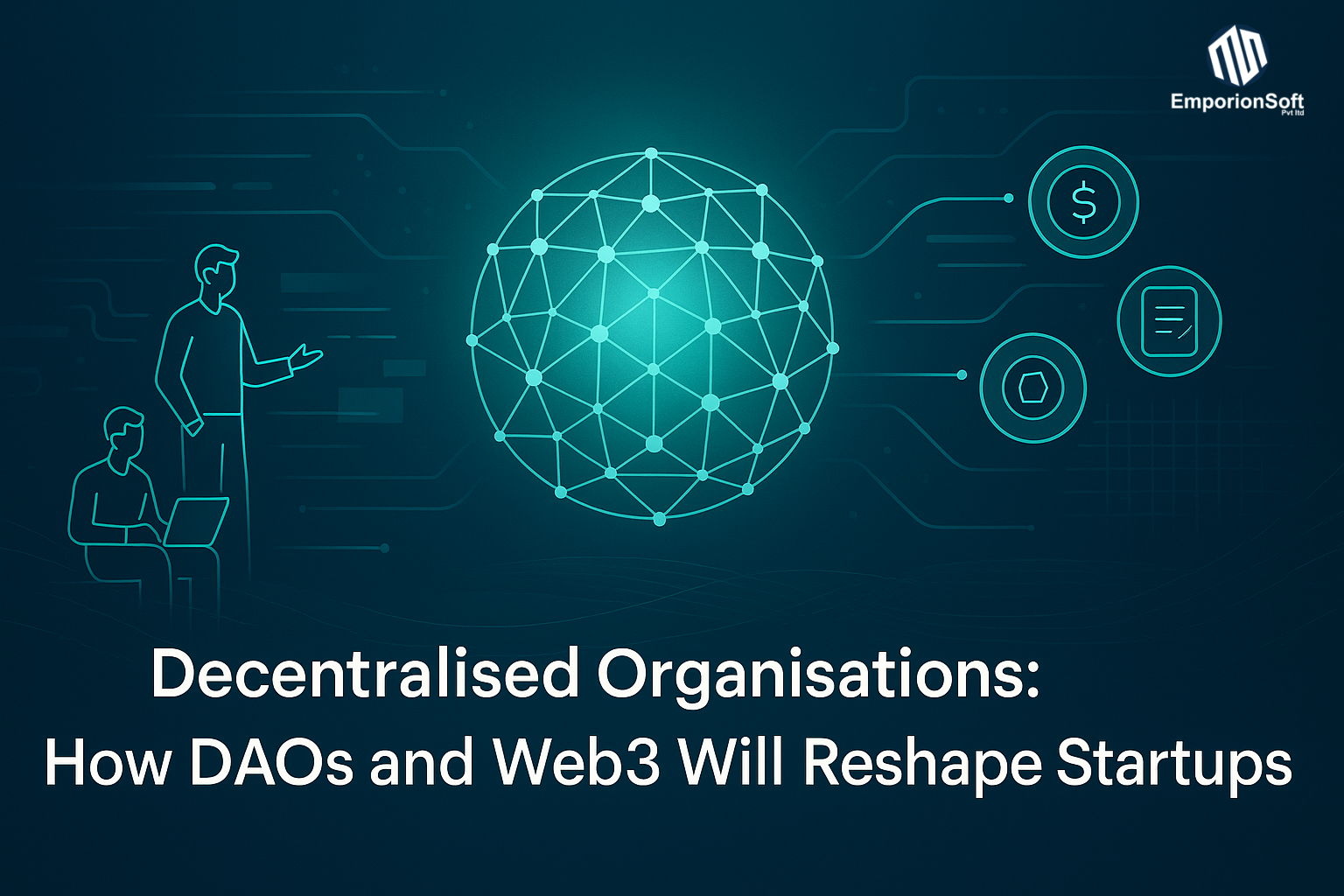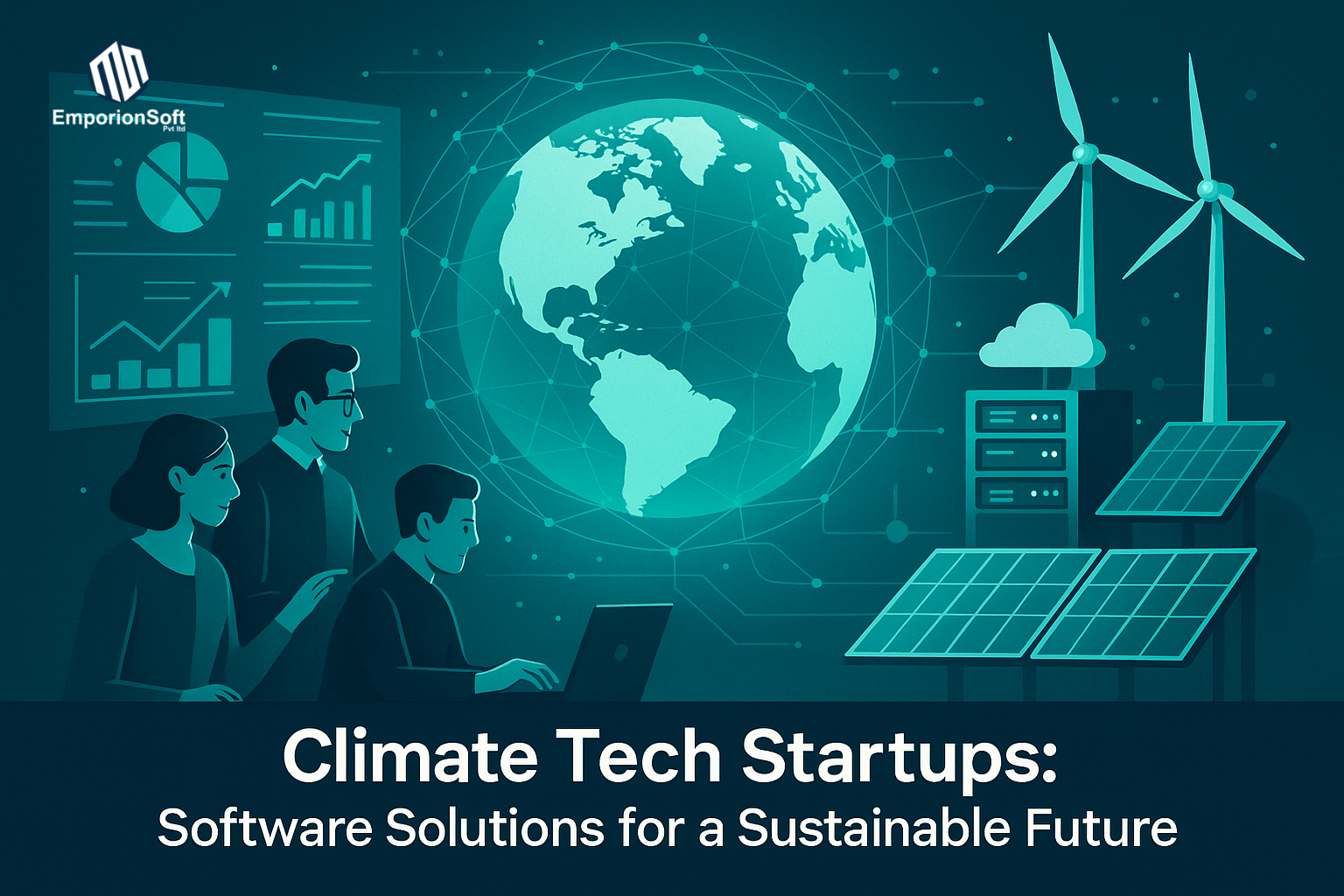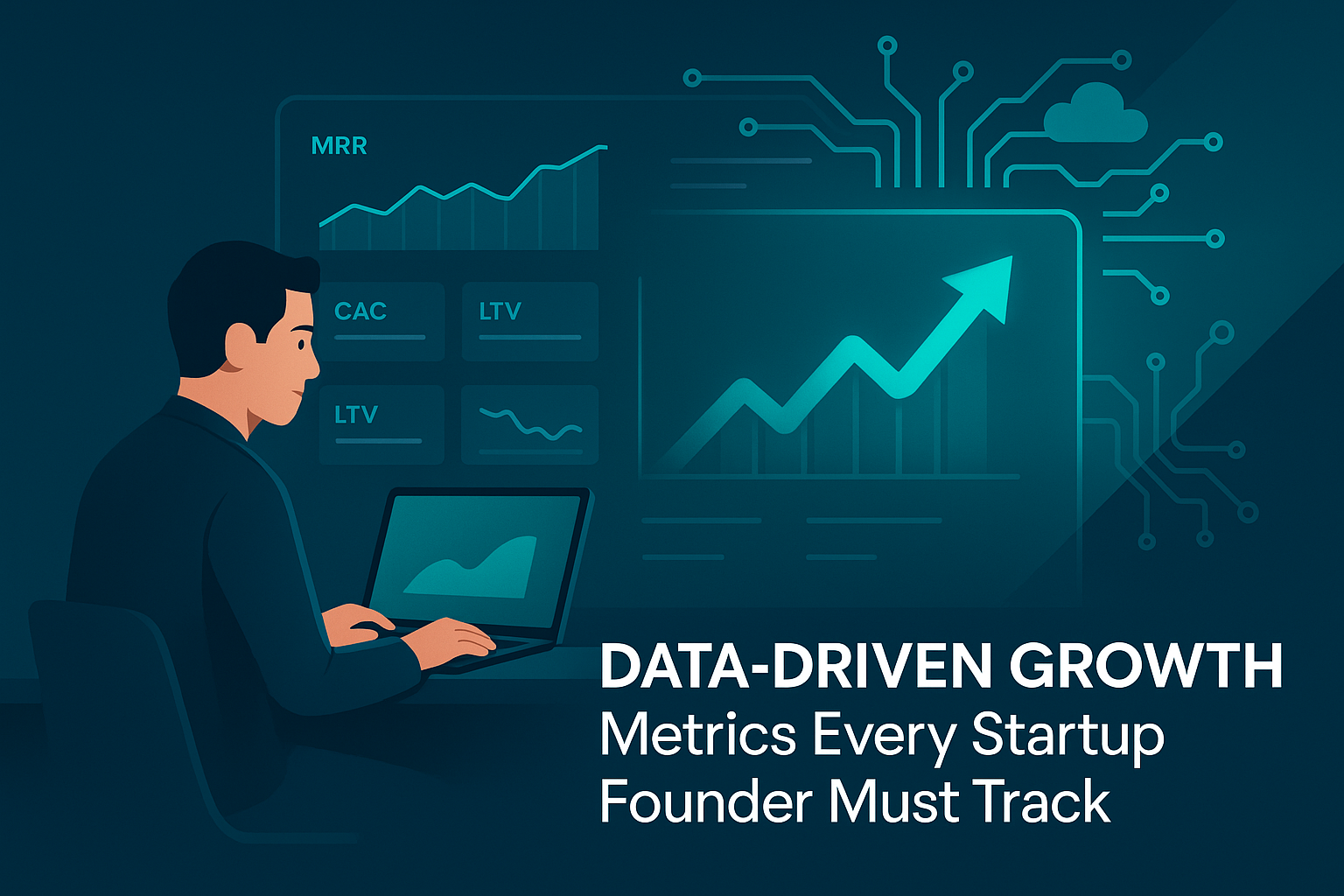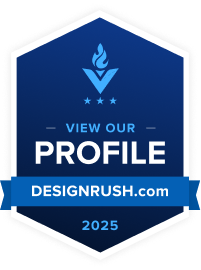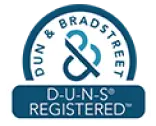Understanding DAOs and Web3: The Next Evolution in Startup Governance
In today’s rapidly changing digital economy, the traditional idea of a centralised corporation led by executives and shareholders is being challenged. Across the globe, a new model of organisational governance is emerging — one that prioritises community ownership, transparency, and automation. This model, powered by blockchain, is known as the Decentralised Autonomous Organisation (DAO). Together with Web3 technologies, DAOs represent a profound shift in how startups are built, managed, and scaled in a trustless, borderless ecosystem.
What Are DAOs and How Do They Work?
A DAO (Decentralised Autonomous Organisation) is a blockchain-based entity governed by code rather than people. It operates through smart contracts — self-executing agreements that automatically enforce decisions based on predefined rules. Unlike traditional organisations that rely on hierarchical management structures, DAOs use transparent protocols where every transaction, vote, or funding proposal is recorded on the blockchain.
Each member of a DAO typically holds governance tokens, representing their voting power. Instead of a CEO or board making top-down decisions, every member can propose, discuss, and vote on initiatives. This creates a democratic, community-led ecosystem where power is distributed equally among participants — not concentrated in a few hands.
As explained by Ethereum.org, DAOs eliminate the need for central authorities by embedding decision-making logic into code. This allows communities to collaborate, invest, and innovate collectively while ensuring all actions remain transparent and verifiable on-chain.
DAOs and Web3: Redefining Organisational Governance
To understand DAOs and Web3, it’s essential to recognise how Web3 builds upon earlier internet generations. While Web 1.0 was read-only and Web 2.0 introduced social interactivity, Web3 integrates blockchain, smart contracts, and decentralised identity. It gives individuals digital ownership of assets, identities, and even communities — creating the foundation for DAOs to thrive.
Web3 enables trustless collaboration, meaning individuals and startups can work together without relying on intermediaries. Startups can raise funds, share profits, and make governance decisions automatically through smart contracts — all while maintaining complete transparency. This model has proven transformative in sectors like decentralised finance (DeFi), supply chain, and creative economies, where coordination and trust are critical.
In Pakistan, the growing interest in blockchain development and Web3 communities is paving the way for DAO innovation. Many emerging entrepreneurs are asking, “what is DAO in Web3 Pakistan?” The answer lies in this synergy: DAOs offer a blueprint for collective startup ownership, while Web3 provides the technological backbone enabling this model to scale securely across industries.
Why DAOs Matter for Startups
For startups, DAOs represent a revolution in organisational design. Instead of being tied to a legal jurisdiction or physical office, DAOs can operate globally from day one. Smart contracts ensure fair participation, automate funding rounds, and maintain integrity without manual intervention. This not only reduces operational costs but also builds stronger community engagement — turning early supporters into active stakeholders.
Moreover, DAOs foster innovation through open-source collaboration. Developers and entrepreneurs can build new features, suggest improvements, or even fork existing DAO frameworks to suit their business needs. This flexibility and transparency are driving a surge of interest among Web3 startups and blockchain enthusiasts worldwide.
Industry experts, including analysts at CoinDesk, argue that DAOs are not merely a trend but a long-term shift in how organisations will function in a decentralised future. As blockchain adoption accelerates in emerging markets such as Pakistan, DAOs will likely play a central role in shaping next-generation tech ventures.
Laying the Groundwork for the Next Frontier
The combination of DAOs and Web3 is fundamentally redefining what it means to build and lead a startup. Instead of relying on institutional investors or rigid corporate frameworks, founders can now establish community-owned ecosystems that reward participation and innovation.
As organisations evolve toward autonomy and inclusivity, the focus will increasingly shift toward tokenised governance — a model where decision-making and ownership are encoded directly into the blockchain.
Tokenised Governance: How Blockchain Empowers DAOs
In 2023, the global blockchain community witnessed a remarkable example of decentralised decision-making when MakerDAO, one of the world’s largest decentralised finance (DeFi) projects, allowed token holders to vote on key monetary policies worth billions of dollars. Every proposal — from adjusting lending rates to modifying collateral types — was decided not by executives, but by the DAO’s global community through token-based governance. This transparent and inclusive model is now inspiring startups worldwide, including those in Pakistan, to explore tokenised governance as a foundation for community-led innovation.
What Is Tokenised Governance and How Does It Work?
To understand DAO governance explained, we first need to unpack the concept of tokenised governance. In simple terms, tokenised governance refers to a decentralised voting and decision-making system where stakeholders use blockchain-based governance tokens to influence the direction of a project or organisation.
Each token represents voting power. The more tokens a user holds (often earned through contributions, investment, or participation), the greater their ability to influence strategic decisions such as project funding, partnerships, or product development. Unlike traditional corporate structures, where board members and investors make exclusive decisions, tokenised governance distributes authority among the community.
This system operates through smart contracts — self-executing codes that automatically tally votes and enforce outcomes without human bias or interference. The result is a model that is transparent, tamper-proof, and fully auditable, empowering members to collectively steer the DAO’s mission in real time.
The Power of Tokenised Governance in Pakistan’s Web3 Landscape
The rise of tokenised governance in Pakistan signifies more than just technological progress — it symbolises a cultural shift in how organisations operate. Pakistan’s tech ecosystem, already home to a growing number of blockchain enthusiasts and developers, is gradually adopting DAO-based frameworks to promote community ownership and decentralised decision-making.
In particular, blockchain DAO startups in Pakistan are experimenting with token voting for various use cases — from crowdfunding and open-source development to cooperative business models. For example, local blockchain incubators and DeFi-focused groups have begun to design DAO structures that allow contributors to propose new features or allocate shared resources transparently.
This innovation holds significant appeal for startups seeking to attract Web3 investors. Tokenised systems create measurable accountability by linking decision-making directly to token ownership, ensuring that those who are most invested in the project’s success have a proportional voice in its governance.
Legal and Operational Benefits for Startups
While tokenised governance offers immense flexibility, its benefits extend far beyond innovation and inclusivity. Legally, DAOs enable startups to function as borderless digital cooperatives, removing the need for physical headquarters or traditional registration structures. Operationally, they streamline governance processes by automating decisions through smart contracts, minimising administrative overhead and reducing the risk of corruption or unilateral control.
For founders and investors in Pakistan, this decentralised framework represents a promising new way to build trust with international partners. Transparent voting and verifiable decision logs can serve as strong compliance tools for emerging Web3 startups in Pakistan, helping them attract both local and global venture capital.
Moreover, DAO frameworks allow adaptive governance — a concept central to modern agile methodologies. By continuously updating governance logic through blockchain-based protocols, organisations can remain responsive to evolving market conditions without relying on traditional bureaucratic hierarchies. This approach mirrors principles discussed in Adaptive Software Development, where flexibility and iteration lead to sustainable growth.
Building a Future of Fair, Transparent, and Scalable Governance
The promise of tokenised governance lies in its ability to democratise decision-making, reduce agency costs, and ensure that every contributor — from developers to investors — has a voice. It’s an emerging governance model particularly well-suited for Pakistan’s vibrant tech startup community, where trust, transparency, and innovation are becoming core differentiators.
As more Pakistani projects explore DAO-based decision-making, the line between technology and community will continue to blur. This shift not only aligns with global blockchain trends but also positions Pakistan as a potential leader in Web3 organisational innovation.
Smart Contracts: The Backbone of DAOs and Web3 Innovation
Imagine signing a business agreement where both parties rely on trust — a promise written on paper, notarised by a third party, and enforced by a legal system that can take weeks or months to resolve disputes. Now imagine the same agreement written in code, automatically executed when predefined conditions are met, without lawyers, intermediaries, or delays. This is the fundamental difference between traditional contracts and smart contracts, the digital backbone of DAOs and Web3 innovation.
Smart contracts are self-executing programs stored on the blockchain. They automatically perform actions — such as releasing payments, allocating votes, or issuing tokens — once the specified rules are met. This automation not only reduces friction and costs but also eliminates the risk of human bias or manipulation. In a world of decentralised systems, smart contracts are the invisible yet powerful enforcers of trust.
How Smart Contracts Power DAOs
In the context of Decentralised Autonomous Organisations (DAOs), smart contracts form the foundation of governance and decision-making. Every action within a DAO — from member onboarding and proposal submission to voting and fund allocation — is encoded into these digital agreements. Once deployed, they run autonomously on the blockchain, ensuring that no single individual or institution can alter outcomes for personal gain.
This architecture has made decentralized organizations more secure, transparent, and scalable. Instead of relying on manual operations or central authorities, DAOs use smart contracts to execute governance logic automatically. When a member submits a proposal, the voting process is handled entirely by the contract, and if approved, the contract instantly releases funds from the DAO’s treasury.
In Pakistan, this model is beginning to gain traction among blockchain innovators and entrepreneurs exploring smart contracts for DAOs Pakistan. As local tech hubs and fintech startups begin experimenting with decentralised governance frameworks, they are turning to blockchain developers in Pakistan to create transparent, tamper-proof systems that automate community operations and startup funding cycles.
Smart Contracts Driving Transparency and Efficiency
One of the greatest strengths of smart contracts is their transparency. Every transaction and action is recorded immutably on the blockchain, allowing participants and external auditors to verify the integrity of DAO operations in real time. This is particularly vital in regions where organisational trust is often undermined by bureaucracy or corruption.
For instance, in DAO-based crowdfunding platforms, smart contracts can hold raised funds in escrow until the community votes to approve a milestone. If the project fails to meet the requirements, funds are automatically refunded — no disputes, no delays. This ensures fairness for contributors and accountability for creators.
Moreover, smart contracts for DAOs are not limited to financial transactions. They’re also being used to automate governance, employee compensation, and open-source collaboration. By embedding business logic into transparent code, startups in Pakistan and beyond can ensure decisions are executed consistently without human interference.
Real-World Examples and Technological Synergy
Projects like Aragon, MolochDAO, and Compound have already demonstrated how smart contracts can redefine organisational management, community voting, and resource allocation. Each of these DAOs relies on blockchain automation to reduce administrative overhead and enable global participation.
For Pakistani developers, the opportunity lies in building similar systems tailored to local industries such as logistics, fintech, and digital services. Collaborating with blockchain developers in Pakistan, startups can deploy tokenised governance models that handle operations at scale while maintaining complete transparency.
EmporionSoft’s ongoing focus on AI-powered automation and decentralised software architectures aligns with this evolution. For example, principles from LLMOps: Scaling, Monitoring, and Optimising Large Language Models and Real-Time AI in Production — such as automation, reliability, and scalability — mirror the goals of smart contract-driven DAOs. Both paradigms aim to create systems that adapt, self-govern, and scale intelligently without human oversight.
The Next Step: Towards Community-Driven Web3 Ecosystems
Smart contracts are more than technical components — they are digital trust engines that make decentralisation viable. By embedding fairness, security, and automation into every transaction, they lay the groundwork for truly community-driven organisations.
In Pakistan’s emerging Web3 ecosystem, these tools will be central to scaling transparent DAOs, democratising access to funding, and redefining how startups operate in the digital economy.
As the next step, we’ll explore how these systems are evolving into dynamic community-driven Web3 ecosystems, where collaboration replaces hierarchy — discussed further in Section 4: “DAO Communities and Web3 Ecosystems: Building Trust Through Participation.”
DAO Communities and Web3 Ecosystems: Building Trust Through Participation
In 2025, a group of young developers in Karachi launched an experimental DAO community in Pakistan aimed at empowering freelancers, designers, and entrepreneurs through shared governance. Instead of relying on a central organisation or external investors, members contributed skills and funds into a collective pool managed by smart contracts. Every decision — from allocating budgets to selecting projects — was made through token-based voting. Within months, the community became a hub for collaborative innovation, showcasing how Web3 ecosystems are redefining entrepreneurship in Pakistan.
This story reflects a broader movement taking shape across the country — one where decentralised collaboration, transparency, and shared ownership are replacing traditional hierarchies. These DAO-led communities are not just changing how startups operate; they are transforming how trust itself is built in the digital economy.
The Rise of DAO and Web3 Communities in Pakistan
The emergence of a vibrant Web3 community in Pakistan marks a turning point for the nation’s digital transformation. From Islamabad’s blockchain meetups to Lahore’s developer hackathons, entrepreneurs are uniting around a shared belief: innovation should be open, community-driven, and borderless.
A DAO (Decentralised Autonomous Organisation) offers precisely this — a governance model that empowers members equally, ensuring all decisions are transparent and verifiable on-chain. For Pakistani startups, this model solves a persistent problem: how to build trust in a system traditionally dominated by opaque management structures.
As developers and blockchain enthusiasts collaborate on open source Web3 communities in Pakistan, they are creating ecosystems that reward contribution rather than position. Each member has a voice, and every line of code or token of support can directly influence the community’s future direction.
Transparency and Collaboration: The Core of DAO Culture
DAOs thrive because they embed transparency and collaboration into their DNA. All proposals, transactions, and votes are publicly visible, enabling full accountability. This model resonates deeply with Pakistan’s growing pool of digital talent — professionals who are increasingly seeking Web3 jobs in Pakistan that value merit, participation, and decentralised ownership.
One of the most remarkable benefits of DAOs is their funding mechanism. Through transparent, blockchain-based treasuries, communities can collectively manage and distribute resources without the need for central administrators. For entrepreneurs, this means fairer access to capital. For contributors, it ensures that their work and ideas are rewarded proportionally to their impact.
Platforms such as Gitcoin have demonstrated how open collaboration and transparent funding can revolutionise innovation. By aligning incentives between creators and contributors, Gitcoin enables DAOs to sustain themselves through continuous community engagement — a model increasingly being replicated by Pakistani developers building localised ecosystems.
Peer-to-Peer Ownership and Innovation
The spirit of Web3 lies in its ability to democratise innovation. Instead of centralised platforms profiting from user data and creativity, Web3 tools empower individuals to own their digital identities, creations, and contributions.
Projects focused on decentralised identity are helping establish this trust layer within Pakistan’s tech space. By verifying digital credentials securely on the blockchain, startups can ensure authenticity while maintaining privacy. This aligns with the principles discussed in Decentralized Identity and Authentication, where digital sovereignty plays a key role in Web3 adoption.
Moreover, as highlighted in The Software Developer’s Roadmap 2025, learning blockchain development and DAO participation is rapidly becoming a must-have skill for modern developers. The intersection of software engineering and community-driven governance is creating new career paths, from smart contract engineers to DAO governance analysts, contributing to a surge in Web3 jobs in Pakistan.
A New Era of Community-Driven Entrepreneurship
The growth of DAO communities is more than a technological shift — it’s a cultural transformation. These decentralised ecosystems foster collaboration over competition, trust over hierarchy, and participation over control. In a society where traditional business structures often struggle with transparency, DAOs offer a refreshing alternative: organisations that are both efficient and democratic.
By combining open-source development, token-based incentives, and borderless participation, DAOs are enabling the next generation of entrepreneurs to build scalable, community-owned enterprises. As Pakistan’s Web3 ecosystem matures, these communities will become the backbone of its digital economy.
DAO vs Web3: Understanding the Relationship Between Decentralisation and Innovation
The terms DAO and Web3 are often used interchangeably in modern tech discussions, yet they represent two distinct — though deeply interconnected — components of the decentralised digital revolution. Understanding their differences and synergies is essential for startups, developers, and investors who aim to leverage blockchain technologies effectively.
Before diving deeper, here’s a clear comparison of DAO vs Web3 explained:
| Aspect | DAO (Decentralised Autonomous Organisation) | Web3 (Decentralised Web) |
|---|---|---|
| Definition | A blockchain-based organisation governed by smart contracts and community voting. | The next generation of the internet powered by blockchain, enabling ownership, decentralisation, and token economies. |
| Primary Function | Facilitates decentralised governance and decision-making. | Provides the infrastructure and tools (blockchains, smart contracts, dApps) that power decentralised ecosystems. |
| Control Structure | Community-driven, token-based governance. | Decentralised ownership through blockchain protocols and user-controlled data. |
| Core Technology | Smart contracts, governance tokens, on-chain voting. | Blockchain networks, decentralised storage, and identity systems. |
| Key Benefit | Transparency and collective ownership. | Security, interoperability, and open innovation. |
| Example Use Case | A DAO funding local blockchain projects in Pakistan through tokenised voting. | A decentralised application (dApp) that connects users to those DAO projects. |
How DAOs Support Web3 Startups
While Web3 serves as the infrastructure layer — the framework upon which decentralised systems operate — DAOs function as the organisational model that governs them. In essence, DAOs are the “how” while Web3 is the “where.”
For example, a Web3 startup might use blockchain to host a decentralised marketplace, but its governance — decisions about platform updates, treasury management, or community rewards — can be managed by a DAO. This symbiotic relationship allows businesses to operate without central authorities, instead relying on transparent rules encoded in smart contracts.
In Pakistan, an increasing number of entrepreneurs are exploring this model as part of the future of Web3 in Pakistan. These innovators recognise that DAOs provide a scalable way to maintain trust, while Web3 infrastructure offers the security and interoperability needed for cross-border growth.
Emerging blockchain hubs in cities like Lahore and Karachi are becoming focal points for Web3 development services in Pakistan, where developers and consultants collaborate to create DAO-integrated dApps. This collaboration not only strengthens community-driven innovation but also enhances Pakistan’s global presence in the decentralised tech economy.
Scalability, Transparency, and Economic Inclusion
One of the primary reasons startups are combining DAOs and Web3 is their ability to foster scalable and transparent ecosystems. Traditional startup governance often faces challenges related to centralisation — limited participation, lack of accountability, and restricted funding access.
By contrast, a DAO operating within the Web3 framework enables open participation where investors, developers, and users can contribute directly to decision-making and funding. Smart contracts ensure every transaction and vote is recorded transparently, building trust among stakeholders without the need for intermediaries.
Moreover, this model encourages economic inclusion, allowing even small contributors to play meaningful roles in shaping projects. In Pakistan’s growing digital landscape, this inclusivity has the potential to attract new talent, drive innovation, and support sustainable startup ecosystems aligned with global blockchain standards.
These developments also align with principles discussed in Future of Cloud Computing and Cloud Providers Comparison 2025, where scalable infrastructures enable businesses to operate efficiently without centralised bottlenecks — much like DAOs do in governance.
The Path Forward: Bridging Governance and Infrastructure
While DAOs provide the governance framework, Web3 delivers the technical foundation that supports it. Together, they are shaping a decentralised economy where ownership, accountability, and innovation coexist seamlessly.
In Pakistan, the increasing collaboration between developers, investors, and policymakers highlights the growing recognition that DAOs and Web3 are more than technologies — they are instruments for building digital independence.
As startups continue to explore decentralised governance models and blockchain-powered platforms, understanding how to align both DAO structures and Web3 technologies will be vital for long-term sustainability and regulatory compliance.
The Future of DAOs and Web3 for Startups: Building the Next Digital Economy
As we move closer to 2030, the line between human collaboration and digital governance is blurring faster than ever before. The convergence of DAOs and Web3 is not just an incremental shift in technology — it represents a complete reimagining of how startups, communities, and even nations will function in the digital age. Startups that once relied on hierarchical structures and centralised funding models are now being replaced by self-governing ecosystems driven by smart contracts, tokenised incentives, and transparent decision-making.
In this rapidly evolving landscape, DAOs and Web3 in Pakistan are emerging as powerful forces capable of democratising entrepreneurship, attracting global investment, and building digital trust across borders. As these technologies mature, Pakistan’s growing developer base and innovative startup culture position the nation to become a leading participant in the decentralised global economy.
A Glimpse Into the Next Decade of Innovation
By 2030, DAOs (Decentralised Autonomous Organisations) will redefine how businesses are built and operated. Instead of traditional hierarchies, teams will form around shared missions, with every stakeholder holding a tokenised vote in key decisions. Smart contracts will handle everything from payroll and project funding to legal agreements, minimising bureaucracy and empowering startups to scale with unmatched efficiency.
In Pakistan, blockchain DAO startups are already experimenting with these models to create transparent funding ecosystems, decentralised marketplaces, and open-source innovation hubs. These communities embody the principles of trustless collaboration and peer-to-peer ownership, ensuring that innovation is driven by merit, not privilege.
For entrepreneurs eager to learn how to create DAO in Pakistan, the opportunity has never been greater. The country’s growing pool of blockchain developers, combined with evolving regulatory awareness and government-led digital transformation initiatives, provides a strong foundation for future decentralised enterprises.
The Four Pillars of a DAO-Driven Economy
Reflecting on the journey through the previous sections of this article, four core pillars emerge as the foundation of the DAO and Web3 revolution:
-
Governance: Tokenised decision-making ensures that communities lead the direction of innovation. DAOs replace traditional management with transparent, consensus-driven structures that strengthen accountability.
-
Automation: Smart contracts eliminate inefficiencies, enabling startups to scale operations automatically and securely.
-
Community: Open collaboration empowers local and global contributors to co-create and share value without intermediaries.
-
Regulation: As policymakers begin to understand blockchain’s transformative potential, frameworks for legal compliance and innovation are steadily forming, ensuring responsible growth for decentralised startups in Pakistan.
Together, these elements lay the groundwork for a resilient, transparent, and participatory digital economy — one where every contributor plays an integral role in shaping progress.
EmporionSoft: Your Partner in Building the Decentralised Future
At EmporionSoft Pvt Ltd, we believe that the future of innovation lies in decentralisation. Our team specialises in helping startups and enterprises design, develop, and deploy Web3 and DAO-based applications that combine the power of blockchain with intuitive user experiences. Whether you’re a visionary founder exploring blockchain DAO startups in Pakistan or an established enterprise seeking to modernise your governance models, EmporionSoft provides the technical expertise and strategic guidance needed to make it happen.
From tokenised voting systems and smart contract development to decentralised identity solutions, our engineers and strategists work closely with clients to bring their Web3 visions to life. With every project, our mission is simple — to help organisations unlock the full potential of decentralisation while ensuring compliance, scalability, and real-world value.
Ready to take the next step toward your decentralised future? Learn more about our expertise through:
Building the Next Digital Economy — Together
As we enter an era defined by DAOs and Web3, startups have the chance to move beyond boundaries, unlocking global collaboration and transparent innovation. With the right combination of governance, automation, community participation, and regulatory insight, Pakistan has the potential to become a Web3 innovation hub — a model for how emerging economies can thrive in a decentralised world.
EmporionSoft Pvt Ltd invites founders, investors, and innovators to join this movement and co-create the future of decentralised business. Let’s build smarter, fairer, and more open digital ecosystems — one DAO at a time.
